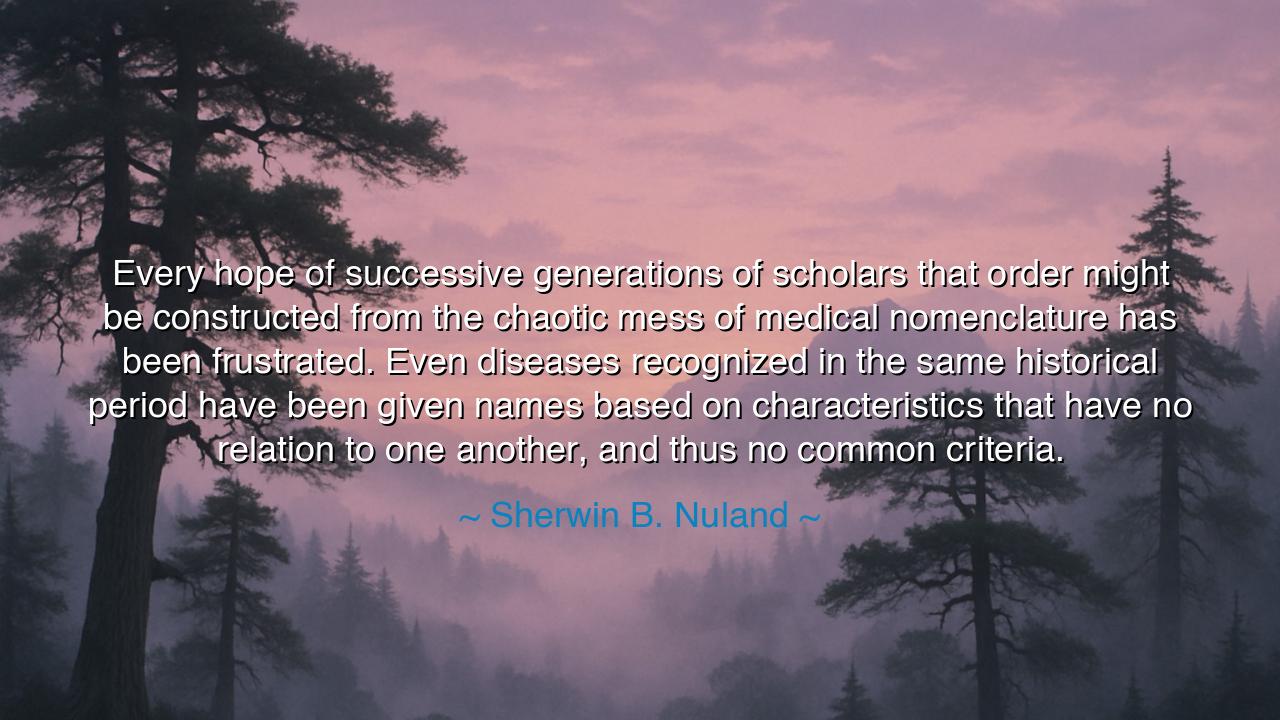
Every hope of successive generations of scholars that order might
Every hope of successive generations of scholars that order might be constructed from the chaotic mess of medical nomenclature has been frustrated. Even diseases recognized in the same historical period have been given names based on characteristics that have no relation to one another, and thus no common criteria.






When Sherwin B. Nuland wrote, “Every hope of successive generations of scholars that order might be constructed from the chaotic mess of medical nomenclature has been frustrated. Even diseases recognized in the same historical period have been given names based on characteristics that have no relation to one another, and thus no common criteria,” he was not merely lamenting a flaw of language — he was unveiling a truth about human understanding itself. His words echo across the ages like the sigh of a sage who has seen that knowledge, for all its brilliance, often moves through confusion before reaching light. In this reflection, Nuland speaks not only of medicine, but of the eternal human struggle to bring order to chaos, to name what we do not yet fully know, and to find harmony amid the fractures of discovery.
To name a thing is to claim some mastery over it. From the dawn of civilization, when early healers gave form to their fears by naming illnesses after spirits or gods, the act of naming has been an act of power. Yet, as Nuland reminds us, the very names we give often reveal our ignorance, not our understanding. The history of medical nomenclature — the naming of diseases — is a testament to humanity’s evolving yet imperfect grasp of the body’s mysteries. What was once called “consumption” we now know as tuberculosis; “dropsy” became edema; “melancholia” transformed into depression. Each new name promised clarity, but beneath each change, confusion lingered — a reminder that knowledge, like healing, is a work forever unfinished.
The origin of Nuland’s lament lies in his lifelong devotion to both medicine and history. As a surgeon and historian, he watched generations of physicians strive to impose order on the bewildering diversity of disease, only to discover that the very structure of human language resisted simplicity. Medicine, he observed, mirrors life itself: vast, intricate, and resistant to confinement. The body is not a machine of logic, but a living symphony, and our efforts to describe its suffering are as flawed as poets trying to name the wind. Each scholar, each healer, adds a word or classification — yet the chaos remains, beautiful and terrible in its complexity.
This truth is not confined to medicine alone. The ancients, too, wrestled with the limits of language. The philosopher Heraclitus taught that the world is in constant flux — that one cannot step into the same river twice — and thus all attempts to fix meaning are destined to fail. Similarly, the Chinese physician Zhang Zhongjing, author of one of the earliest medical texts, lamented that disease names often “capture the symptom but not the essence.” Across cultures, the wisest have known that to seek total order is to war against the nature of existence itself. Yet they continued to seek it — for in the striving, not the success, lies the dignity of human endeavor.
Consider the story of William Harvey, the English physician who first described the circulation of blood. Before him, scholars named bodily functions according to mystical beliefs — the four humors, the vapors, the spirits. Harvey, through reason and observation, shattered centuries of dogma. Yet even he, bound by the language of his time, could not describe every mystery he saw. His discovery brought order, but also revealed new depths of complexity. Nuland’s observation honors men like Harvey: not for what they solved, but for their courage to seek clarity amidst confusion. For it is in this eternal struggle — between chaos and understanding — that knowledge is born.
Nuland’s words carry a deeper wisdom still: that the imperfection of our language reflects the imperfection of our comprehension. Each name we give to a disease, or to any human condition, is an approximation — a shadow cast upon a vast, unseen truth. To accept this is not to surrender to ignorance, but to embrace humility, the most sacred of intellectual virtues. The ancients revered humility because it kept pride from corrupting wisdom. The healer who knows he does not fully know is the one most open to learning, most capable of compassion. For to name wrongly and proceed arrogantly is to harm; but to name tentatively and act with care is to heal.
The lesson, then, is not that order cannot be found, but that it must be sought with reverence and restraint. In your own life, when you face confusion — in work, in study, in love — do not despair of the chaos, for it is the soil from which understanding grows. Seek clarity, yes, but know that truth often hides behind a veil that words cannot pierce. Approach all knowledge, and all people, with patience and humility. Do not be too quick to name, to judge, or to define, for every label limits what it seeks to capture. Instead, honor the mystery, as the healer honors the body — with awe, care, and unending curiosity.
Thus, as Sherwin B. Nuland teaches us, the chaotic mess of medical nomenclature is but a reflection of the human soul’s quest for meaning. The names we create may never be perfect, but the act of seeking order within disorder ennobles us. It is the mark of wisdom to strive for understanding while accepting that total understanding will forever elude us. And so we must live — as healers, as thinkers, as mortals — in the sacred balance between knowledge and wonder, between the names we give and the mysteries that remain.






AAdministratorAdministrator
Welcome, honored guests. Please leave a comment, we will respond soon